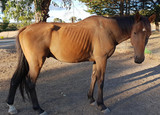Introducing my new Prince (Charming?)...

So about 6 weeks ago, I ended up with a new horse.
Wasn't exactly planned, but I just couldn't resist.
And I'm sure you all know what I'm talking about here...
The conversation with my husband went a little something like this...
'Honey, we've got another horse'.
*Silence*
Finally, the reply (once he got over his moment of stunned silence)...
'You got what!?!'.
Yet after his initial hysteria - he calmed down a little. And one day he might actually speak to me again...
But this horse. This darling, sweet little horse. He was given to me, as a rescue and how could you not want to try to help him.
(I'm a total sucker, I know!)
I've called him Prince. He is a plain bay, 15hh(ish) Thoroughbred, whose had a bit of a tough life. Despite how he looks, the poor boy is only 7.
This is from when we first got him:
And this is now, just 6 weeks later:
Still a long way to go, but it's nice to see the improvement. He's now looking so much brighter and happier - and follows me around like a giant puppy dog! Awwww.
(And yes, despite the fact that I've tried really hard not to get too attached - I kinda do really like him!)
So I figured I might document some of his journey, in the hope that the things that I learn from him, might help you.
Whilst rescuing and rehabilitating horses like these, there are some important considerations to know upfront - before you make the decision to take one on.
1. Come to terms with the fact that a rescue horse - may not ever get better.
No matter how hard you try, when you take a horse on in this poor condition, you do not know what's lurking beneath the surface. If you like the horse - it can certainly be worth a shot (particularly as this one didn't cost me anything!). But believe me, I took him on knowing he could have any number of underlying health issues AND behavioural issues.
So far - so good! He is gaining weight and even as he has regained his energy, is still a really sweet, and relatively chilled out horse. But he does have some very strange quirks - and there aren't any guarantees of his riding suitability later on.
But only take on a rescue - if you can handle the fact that you may just have to put him to sleep down the track. Unfortunately, not all can be saved (but it is nice sometimes to give them a shot!).
2. You do need plenty of horse-handling experience!
A horse in poor condition quite often appears to be fairly quiet. But don't underestimate how lively they can get, once they start getting more feed and their energy levels return.
Be careful - as they can throw you some potentially dangerous surprises, particularly if their history is unknown.
3. Feed them up super slowly.
As tempting as it is to give a rescue horse a whole heap of feed, you do need to take it super slow, particularly in the beginning. You can see the noticable difference in Prince in 6 weeks - but it will probably be another few months before he starts looking like a healthy horse again.
Know, that in these cases, they are a long-term commitment, before you even get to try a saddle on. So you will need extreme patience!
And even after all that patience, it still may not work out.
So there are the three main things to know, before taking on a rescue.
But on the flip side - you get the satisfaction of giving a poor, deserving soul a new lease on life, and a second chance.
And you could end up with a hidden gem!
I'm keeping my fingers and toes crossed for Prince. He seems like a sweet guy and laps up cuddles from me and the kids at any given opportunity.
I just have a funny feeling he came to me to teach me something. And I'm gonna have fun, finding out what that is :)
Sarah

